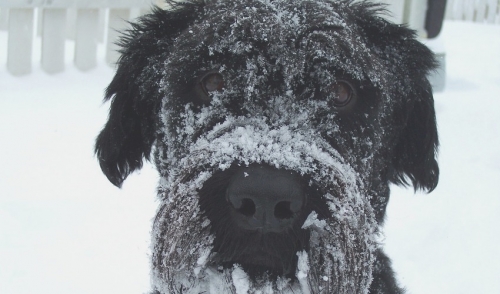{article.name}
Stay Informed
Sign up for email list
for exclusive offers, information and updates!
View our Email Archive
Keeping your Pet Healthy During the Winter

- Share this:
- Share on Facebook
- Pin on Pinterest
- Tweet on Twitter
As it gets cold outside, the potential for harsh weather conditions requires some extra care for your canine and feline friends. Here are some tips to help your pet remain safe and comfortable during the winter months ahead.
- Provide fresh, clean water at all times. Frozen water in outside bowls is a common winter hazard, so check it often and use a plastic bowl instead of a metal one (remember “The Christmas Story!”). Your dog will thank you. Heated water bowls are available if necessary.
- Bring Fido inside during sub-zero temperatures and winter storms. Even though most dogs grow a winter coat to help protect them from the cold, their natural environment is not in temperatures that are sub-zero! If left outside for an extended period without protection, they can get frostbite (especially on the pads of the feet, ears and tail) or even freeze to death. If dogs are housed outdoors during the winter, make sure they have adequate insulated shelter to protect them from the wind and moisture.
- Keep poisons away – Antifreeze is deadly! Dogs enjoy the sweet taste of this necessary toxic substance. Take care to clean up drips and spills and store it out of reach. If ingested, get your pet to the vet immediately. Beautiful winter poinsettias are also toxic to pets.
- Keep your pet’s paws clean and dry. Chemical de-icers and salt can cause paw discomfort and can result in cracking and bleeding of the foot pads. Snow and ice can also accumulate between your pet’s toes, causing pain as well as bleeding and sores.
- Avoid over-bathing. Too many baths during the winter months can strip the natural oils from your pet and result in dry, itchy skin. It is better to limit baths to when it is absolutely necessary and simply spot-clean your pet when possible.
- Feed a premium food. Proper nutrition is always important, especially if your dog is housed outdoors. When temperatures are colder, outside dogs will generally need more food to help keep their bodies warm. Inside dogs may need less food if their activity level is significantly cut back due to extreme weather conditions. You may need to consult your veterinarian and adjust the amount of food your pet receives based on his body condition. Keeping these precautions in mind, and making necessary preparations as winter approaches, will ensure that your pet will remain naturally healthy and happy as we welcome another new year.
Source material for this blog article was provided by Purina Mills, Inc. © 2008
Special Offers
We are constantly adding new specials to our site. Be sure to check back often!


Comments